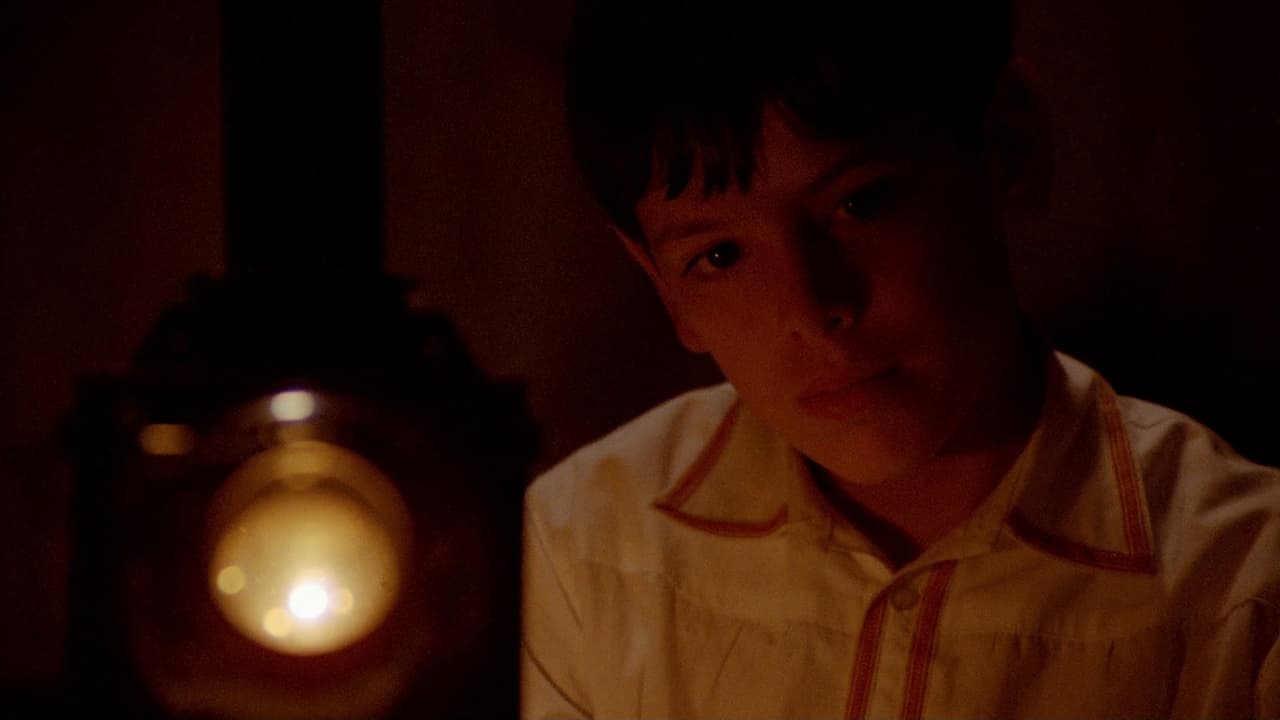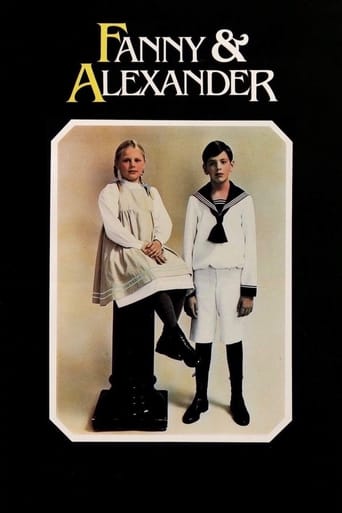Smoreni Zmaj
Bergman's swan song bedeviled me pretty much. Movie lasts more than three hours and at the very beginning it already bored me to death. Still, I was aware it's Bergman so I didn't wanna give up easily. But hour came and passed and the film was close to half when I finally became agitated and pushed stop button. Settings, costumes, acting, camera work and directing are fantastic. Trouble is that it's beautifully filmed Nothing. For the duration of an average movie, we are looking at a somewhat unusual family that, at the beginning of the twentieth century, lives a boring day-to-day life. No plot, no story, drama, humor, nothing at all.One of the most boring movies I have ever seen. I went to eat something and make a coffee and after a while I got back to my computer to watch the show I started yesterday. But my precious OCD wouldn't let me concentrate. I never leave movies I once started and I simply couldn't do it now. So I got back to Bergman.Literally minutes later things began to happen and form one pretty decent story. Ok, it was still slow and nothing special, but satisfying enough to hold my attention till the end. First half of the movie had no story at all and all the magnificence of other aspects of the film is in vain when they do not have any purpose. Even if everything else is for ten, if story is terrible you get lousy movie. Story in second half of the movie is really nothing special, but it's good enough not to destroy beauty of the rest of the movie. If story was at level with everything else this would be 10/10. If there was no first hour of the movie it would be 8,5/10. But I simply can not forgive the agony first hour put me through. I'm not rating only camera or only directing, only it's soul or just the last hour. I'm rating overall impression of movie as a whole. And for that reason I rate it 7/10. But at the same time I want to recommend it as feat for the eyes of those who cherish aesthetics enough to ignore lack of plot.7/10Movie was nominated for 6 Oscars and it won 4. All 4 well deserved. In my opinion, Bergman also deserved his nomination for directing to win too. But nomination for the best screenplay sounds to me like bad joke.Actress who plays grandmother, and who is maybe even leading character of this movie, irresistibly reminds me of Cameron Diaz. I wonder is this just me or there's more people who see this resemblance.
patriciasmaynard
When I watched this film the first feeling I get is that it's like reading a great book. That's how comprehensive it is. That's how much depth there is, created by Bergman here. I normally say that films can't compare to books, but this film is something else. This film has characters that are fully formed.Bergman's created a magical, fantasy world that at times tends toward the supernatural, but then throughout the story is fleshed out as realistic as they come. This is what makes the extraordinary scenes even more extraordinary than it already is. I heard that this film is unlike Bergman's others. I'm not so sure about that. It's longer, yes but the longer version is far superior to the theatrical version. I loved the longer scenes that were added to the television release. There Bergman has more time for more magic, and more time to develop some of the secondary characters. The title gives away the two main characters, the two children Fanny and Alexander. However the film is also largely about their parents and relatives. You wonder why Bergman named the film after them then. It's probably to underline the difference in the attitudes of these two characters with Alex rising to the top, and Fanny in the background. I wonder whether this reflects with the realities that Bergman's painting for us. What I enjoyed the most is the relationship between the priest and one of the female characters. I won't give away the details, but some of the acting scenes between them and their family members is quite incredible. As is usual with Bergman, there's also some theatrical scenes but you'd expect that, again, from a family of actors. I love the way Bergman brings in the theatrical world into this family and it certainly rubs that magical touch that we come to love in his films. Fanny and Alexander may not be as fancy as Persona, but I feel that the quality here is much higher.
ElMaruecan82
"Fanny and Alexander" starts with a lavish Christmas reunion of the same epic scale and narrative value as the wedding party in "The Godfather". It then proceeds to an untimely death that put all the family in shock. When mourning time is over, the widow resigns to find a stronger role model for her children, she marries a rigid bishop and then life flies over the darkest and toughest pages of the Family book, punctuated with strange supernatural encounters and deep metaphysical wanderings. Eventually, death shows up again, natural or not, and the movie concludes with another family reunion, celebrating two births, and through them, life with its share of joy, sadness, silences, cries, whispers… and wild strawberries. It is a credit to Ingmar Bergman's visionary practicality to make a film about a bourgeois family, spanning a relatively short lapse of time, yet containing a plot whose existential implications could cover countless pages of philosophical essays. Life and death, their meanings or meaninglessness, have never been as fully approached without ever exuding "intellectual" vibes. It is indeed extraordinary that such a film would also manage to tell an entertaining and captivating family drama's story. And no less extraordinary that the film, deprived from more than one-hour and half, would still manage to maintain its relevance and style (almost) intact and be such a universally praised masterpiece. But who said Ingmar Bergman was an ordinary director? This is the work of a lifetime and if Bergman really decided to make it his testimony film, he couldn't have found a better way to conclude his body of work. There's more than a story about children in "Fanny and Alexander", the title is rather misleading on that level, the film, set at the dawn of the 20th century, circa Bergman's childhood, shows the very world that shaped the tormented mind of the soon-to-be cinematic genius, a world of contradictions where lust is forbidden but temptation everywhere. There is this eternal presence of God, from the joyful Christmas celebration to the grim discipline of an overzealous Bishop; but the ultimate paradox of Bergman's movie is that it's less God's nonexistence than his silence that calls for doubt and anger. God is Bergman's most defining antagonist.And in this lost battle, each one finds his way. Like "The Godfather", the central Family, the Ekdahls, is a fascinating mix of personalities: from a gentle matriarch who keeps on her respectable facade, to her sons, they all have a different approach to life. Gustav Adolf, a baker and hedonistic man, seizes the day and enjoys flirting and partying with maids, with the surprisingly progressive consent of his wife. Carl is the second son, a failed professor who's responsible for perhaps the most heart-wrenching loser's monologue I've ever seen in a film. He's disgusted by his failure and even the consolations' attempts of his well-meaning German wife are welcomed by hatred and disdain, this is a well-educated man who've lost his faith on life and goes through it, chained to the certitude of his own mediocrity.The third son is Oscar, he manages a theatrical troop with his beautiful wife Emilie (Ewa Fröling), also an actress along with their children, Fanny and Alexander. The man is worn down by the weight of stress and after Christmas, he's victim of a fatal stroke. Alexander can't stand the sight of his father dying, he hides under a table and utters curse words during the funeral; this is a child desperately hanging on his childhood with a rather adult tenacity. But his greatest challenge comes when the existentially lost Emilie, chooses the austere yet handsome Bishop (Jan Malmsjö)… as a husband, finding in this man the serene connection to reality she felt lacking in her life. Then starts the soul-wrestling relationship between the Bishop and Alexander, confronted to the tyranny of God's rules, and their punishments. You could think Bergman, as a son of a rigid Lutherian, took his autobiographical revenge, but the Bishop is less a villain than a tragic man, lost in the illusion of his own authority being endorsed by God. Indeed, from the chess game in "The Seventh Seal" to the agony in "Cries and Whispers", God is never as present as during painful moments… and ironically, life is never as exhilarated as when Death is coming. But there's a different tone in this film, actually more serene, there's a sort of consensus regarding the whole illusion of life, no one is fooled. Even the dead ones aren't of any help. Only the grandmother's Jewish lover (Erland Josephson) has a foot in each world and connects mysticism and reality, as if they finally could reconcile, as if illusion was either the lesser of two evils or a survival game. And this might be why the film, for all its complexity and dramatic undertones, solved its two crucial plot points with "lousy" Deus Ex Machina, what an ironic but so well-put nose thumbs to us, purist and cinematic rigorists. Maybe it is a way to show that God stopped to be an antagonist, and he would always have the final word, but finally, with Bergman's consent. And here's the genius closing the arc of his religious torments like "Scenes from a Marriage" did for the theme of infidelity. And on that level, the best advice I could give is: do yourself a favor and watch the full version just like for the "Marriage" masterpiece. Surely, one hundred extra minutes of Bergman's epitaph movie is an offer a fan wouldn't refuse. And as a fan, I'll conclude the review by saying that Begman is certainly the most original and compelling director, too unfairly associated with black and white intellectual movies while there was more than that, there was human condition with style à la Da Vinci and Shakespearean intensity, he's perhaps the greatest artist of Cinema, a cinematic God with God as a centerpiece.

